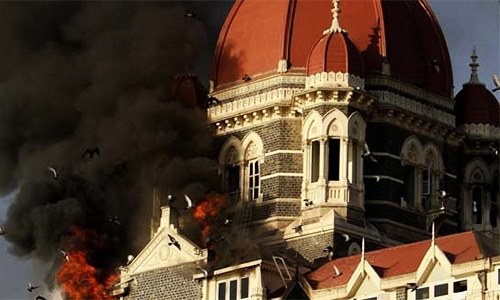“IN the recent history of relations between India and Pakistan, it has seemed an immutable law: that any apparent political breakthrough will be followed by a terrorist atrocity in India blamed on agents of the Pakistan state.” Further, “to call off the dialogue gives the terrorists what they want”.
This is what The Economist said a week after the terrorist attack on the air force base in Pathankot. There was a terrorist attack in Gurdaspur on 27 July last. It is all very reminiscent of the train blasts in Mumbai in July 2006 and the terrorist attacks in Mumbai on Nov 26, 2008.
The one common feature in all these outrages in the decade from 2006 to 2016 is that they were perpetrated in the phase when détente in the relations between India and Pakistan seemed promising.
There is need to prepare public opinion on militancy.
There is, however, a marked difference between the reaction to the Pathankot incident and the one to the 2008 Mumbai attacks. The consensus is in favour of proceeding with that process while seeking redress for the wrongs; by making an end to terrorism the first item on the agenda of the talks.
The most significant comment came from the moderate All Parties Hurriyat Conference headed by Mirwaiz Umar Farooq. “As we have seen in the past, whenever there is a serious effort made by India and Pakistan to resolve issues, incidents like this have taken place with the aim to derail the dialogue process. The elements who seek to vitiate the atmosphere and derail the dialogue process are working against the interest of the people of South Asia.”
It urged the prime ministers “to carry forward and work together to try and rid the region of conflict and violence”.
There are fundamental differences between the reactions to Pathankot and Mumbai. One is India’s trust in Prime Minister Nawaz Sharif.
This explains India’s Home Minister Rajnath Singh’s statement on Jan 12: “The Pakistani government has said it will take effective action. I think we should wait.”
He referred to press reports of the government of Pakistan executing the arrest of some persons suspected of complicity in the Jan 2 attack and to the high-level team it had set up to look into the evidence given by the Indian government.
He pointedly said, “Since they have given an assurance to the Indian government, we don’t have any reason to doubt them. We should wait for some time. There is no reason to distrust them as of now.”
But this also raises expectations in India. If results are not forthcoming — as in the Mumbai case — the trust will be transformed into bitter disappointment. Diplomacy must work its way despite acts of terrorism.
Prime Minister Narendra Modi told his host at Lahore, on Dec 25: “Ab yahan aana jaana laga rahega” (Now there will be visits). Those who attacked the Pathankot air force base must be renewing their sordid resolve as doggedly.
Is it not time that a durable, effective mechanism against terrorism was devised, simultaneously with action against the culprits in Pakistan, for the countries to set in motion whenever the militants launch an attack? Former prime minister Manmohan Singh and president Pervez Musharraf had devised one at Havana in 2006 but it got nowhere for political reasons.
In 2008, the two countries came fairly close to evolving one on an ad hoc basis. Had it succeeded, it would have laid the basis for a permanent accord. Reportedly, when the two prime ministers spoke on the phone soon after the attacks, Manmohan Singh invited the director general of the ISI. This was agreed to but then the ISI objected.
The crucial question is the degree of cooperation in the investigation. Sending the intelligence chief was too much to expect of any state. Very soon after the announcement, it was clarified that someone of lower rank would go; the director general following him, if need be.
The Ministry of External Affairs official spokesman Vikas Swarup, a distinguished novelist incidentally, said on Jan 14 that the national security advisers have been in touch; the foreign secretaries’ talks will be held in the “very near future”; Pakistan’s actions are welcomed and so will be the team it proposes to send. This is progress — unlike in 2008.
There is need to prepare public opinion on terrorism, and on the states’ refusal to abide by its perpetrators’ wishes by citing examples elsewhere.
In October 1984, at Brighton during the Conservative Party’s annual conference, the Irish Republican Army blew up the hotel where Margaret Thatcher and her colleagues were staying. Before long she was secretly in contact with it. Its splinter group, the Irish National Liberation Army was far worse. The peace process continued while more terrorist attacks followed.
The writer is an author and a lawyer based in Mumbai.
Published in Dawn, January 16th, 2016















































